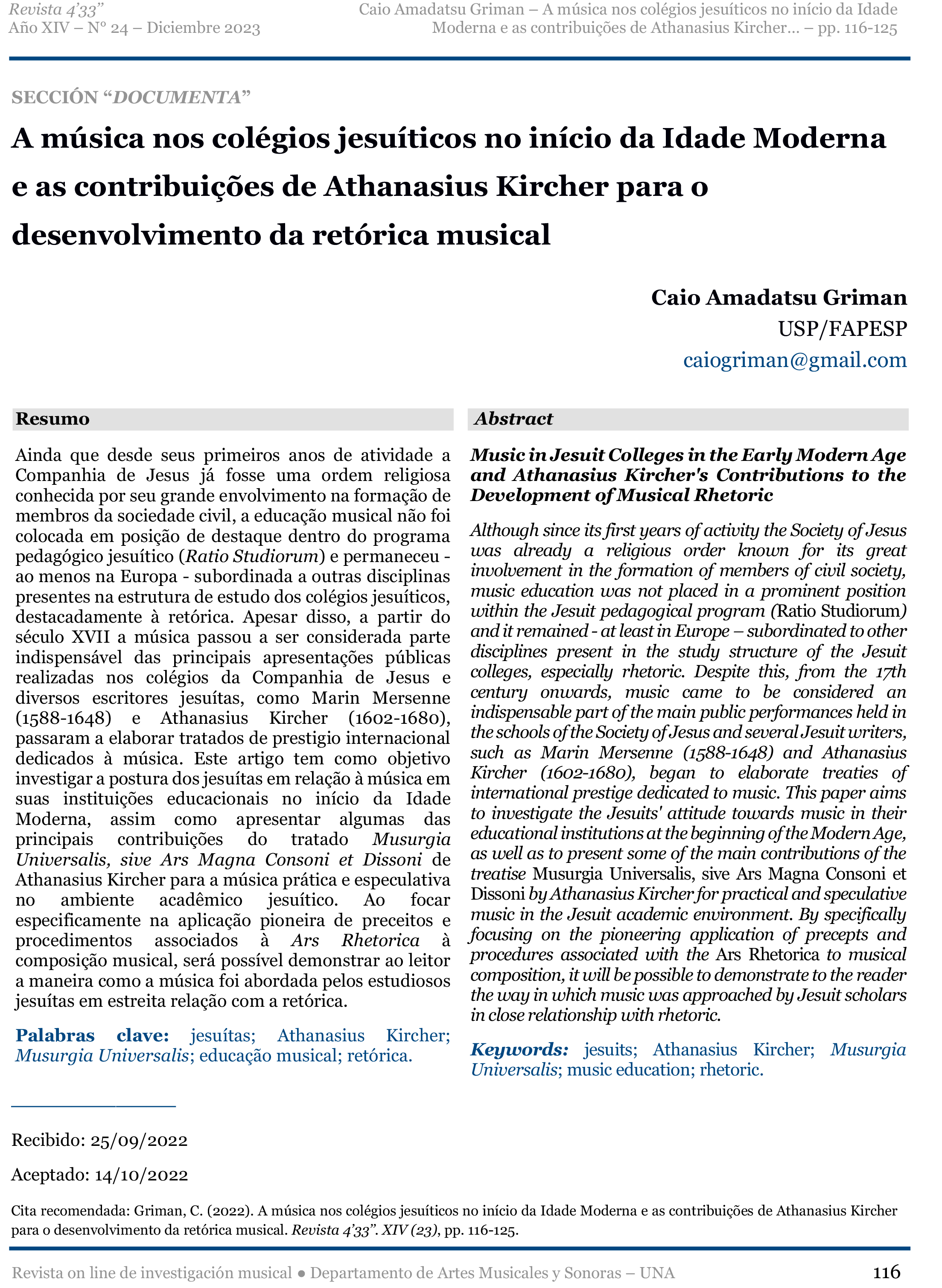A música nos colégios jesuíticos no início da Idade Moderna e as contribuições de Athanasius Kircher para o desenvolvimento da retórica musical
Palabras clave:
jesuítas, Athanasius Kircher, Musurgia Universalis, retórica, educação musica, rhetoric, music educationResumen
Resumo
Ainda que desde seus primeiros anos de atividade a Companhia de Jesus já fosse uma ordem religiosa conhecida por seu grande envolvimento na formação de membros da sociedade civil, a educação musical não foi colocada em posição de destaque dentro do programa pedagógico jesuítico (Ratio Studiorum) e permaneceu - ao menos na Europa - subordinada a outras disciplinas presentes na estrutura de estudo dos colégios jesuíticos, destacadamente à retórica. Apesar disso, a partir do século XVII a música passou a ser considerada parte indispensável das principais apresentações públicas realizadas nos colégios da Companhia de Jesus e diversos escritores jesuítas, como Marin Mersenne (1588-1648) e Athanasius Kircher (1602-1680), passaram a elaborar tratados de prestigio internacional dedicados à música. Este artigo tem como objetivo investigar a postura dos jesuítas em relação à música em suas instituições educacionais no início da Idade Moderna, assim como apresentar algumas das principais contribuições do tratado Musurgia Universalis, sive Ars Magna Consoni et Dissoni de Athanasius Kircher para a música prática e especulativa no ambiente acadêmico jesuítico. Ao focar especificamente na aplicação pioneira de preceitos e procedimentos associados à Ars Rhetorica à composição musical, será possível demonstrar ao leitor a maneira como a música foi abordada pelos estudiosos jesuítas em estreita relação com a retórica.
Abstract
Music in Jesuit Colleges in the Early Modern Age and Athanasius Kircher's Contributions to the Development of Musical Rhetoric Although since its first years of activity the Society of Jesus was already a religious order known for its great involvement in the formation of members of civil society, music education was not placed in a prominent position within the Jesuit pedagogical program (Ratio Studiorum) and it remained - at least in Europe – subordinated to other disciplines present in the study structure of the Jesuit colleges, especially rhetoric. Despite this, from the 17th century onwards, music came to be considered an indispensable part of the main public performances held in the schools of the Society of Jesus and several Jesuit writers, such as Marin Mersenne (1588-1648) and Athanasius Kircher (1602-1680), began to elaborate treaties of international prestige dedicated to music. This paper aims to investigate the Jesuits' attitude towards music in their educational institutions at the beginning of the Modern Age, as well as to present some of the main contributions of the treatise Musurgia Universalis, sive Ars Magna Consoni et Dissoni by Athanasius Kircher for practical and speculative music in the Jesuit academic environment. By specifically focusing on the pioneering application of precepts and procedures associated with the Ars Rhetorica to musical composition, it will be possible to demonstrate to the reader the way in which music was approached by Jesuit scholars in close relationship with rhetoric.


